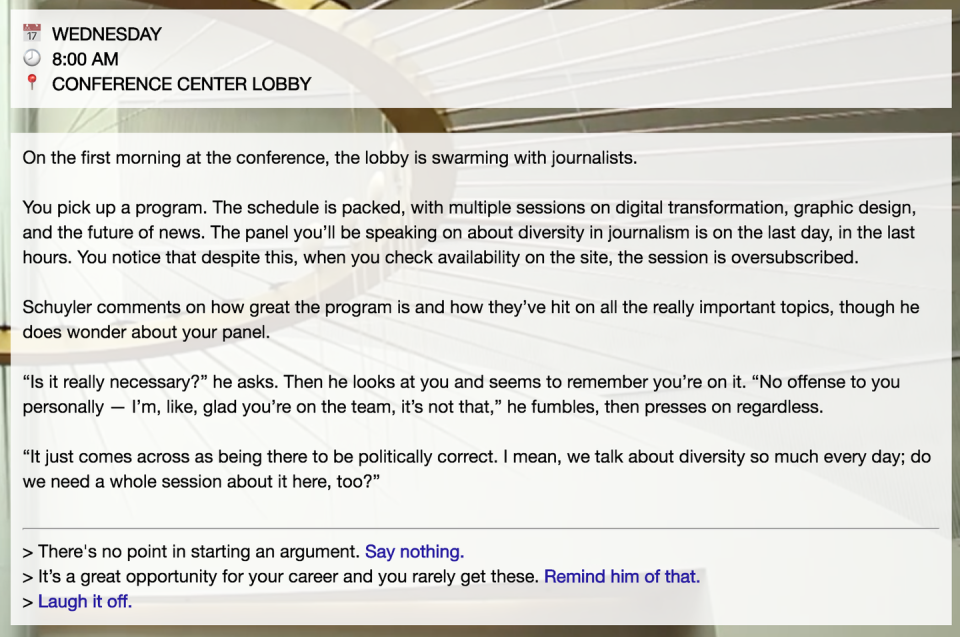How Farah Mohammed Made an Unbeatable Video Game About Being a Journalist of Color

Some video games invite us into fantastical worlds, where the villains breathe fire, cast mythical spells, or take to the skies in winged flight. Other video games, like Off the Record, invite us to reconsider our own run-of-the-mill reality, where the villains are far more insidious—and can’t be neatly cut down by a mythical sword.
In this incisive, choose-your-own-adventure game, your character is Z. Khan, the Identities Reporter at a buzzy digital publication called CLIX. After three years in the digital media trenches, you’re up for a promotion to managing editor—but before the powers that be can make you a formal offer, you’re heading off to a journalism conference, where you’ve been asked to sit on a diversity panel. Your time at the conference illuminates the daily minefields that journalists of color must navigate on the job, from microaggressions in the newsroom to inappropriate comments from colleagues. In Z. Khan’s shoes, you’ll be told by your boss to be more “realistic” about diversity initiatives, lectured by a colleague on how tiresome they find political correctness, and racially profiled at the door of the conference, among other brutal hurdles.

Journalists of color make up just 22 percent of salaried journalism employees, according to a 2019 survey, with barriers to entry and advancement thrown in their paths every single day. Those barriers take a human toll, and journalists of color are leaving the industry as trauma, burnout, and stress culminate. In the preface of Off the Record, creator Farah Mohammed writes, “This story presents only a few of the hundreds of small decisions that journalists of color have to make, every day, that may have profound impacts on their careers and sense of self.” And at the conclusion of the game, you’re faced with a wall of tweets collected from “the real Z. Khans”—AKA, journalists of color who bravely shared their experiences on social media.
Off the Record was developed in partnership with Study Hall, which acts as an online support system for media workers, and released in August. It is Study Hall’s first foray into gaming, and free and accessible at all. To play the game, especially as a white person, is to experience an exercise in radical empathy, with Mohammed illuminating the debilitating slings and arrows that grind journalists of color down over time. As media companies (including this one) continue to be questioned, it provides a unique vantage point into the profound brokenness of not just the media establishment, but the working world writ large.
Mohammed, a veteran journalist, is currently an editor at Narratively and a freelance writer; she left full-time employment in journalism to pursue a Masters of Mental Health at the University of Edinburgh, owing in part, she says, to the constant trauma she witnessed in the field of journalism. Mohammed Zoomed with Esquire from London to speak about the process of bringing Off the Record to life, the outpouring of support she received on social media after its release, as well as the impossibility of truly winning the game, no matter how high you climb.
Esquire: Where did this game begin for you?
Farah Mohammed: There's a subgroup within Study Hall for journalists of color. I can't remember what the inciting incident was, but something happened out in the world [in February 2020]. We were all really angry, and we were weighing what we could possibly say to people. What could we possibly do? We'd made lists of reading recommendations, we'd had the committees, we'd done it all. Almost facetiously, someone said, “If this is a VR game, that might get it across to people,” and I said, “I can do a game.” I knew I couldn't make a VR game, but in my head, I thought, “That's not a terrible idea, actually putting someone in the place of a journalist of color rather than the stuff we've tried over and over again.” I pitched it to a Study Hall editor, and I was really impressed that they came on board. I saw it as a much smaller thing, and immediately they said, “Let's take this bigger. This can be longer, this can be bigger, this can be interactive.”
Mary [Truong, the game’s designer] and I have been pleasantly overwhelmed by the response, which is good, and at the same time, kind of sad. We're glad it resonates with people and we're glad it's getting attention. I think it came at the right time and at the right cultural moment.
ESQ: How long did it take to bring this game to life?
FM: This started in February 2020. Then the pandemic hit in March, and everything stalled because we were all so overwhelmed. To be honest, we didn't really talk about the game for about two months, because who was talking about anything for two months? Then George Floyd happened. I got back in touch with Study Hall and said, “Do you want to do this or do you not? Either this is too sensitive or it's the right time.” They felt it was the right time, and that got the ball moving again. I think it was a brave move, because it was scary. No one knew how anyone was going to react to Off the Record. At that time, there was so much hurt and anger.
We took a couple of weeks [working on it] and we sent it out to other people, who are listed in the special thanks on the game. We didn't have the final scenes when they looked at it, because their feedback was to make it longer. Originally, when you got the promotion, it just ended in the office. They said, “We want to be able to see that if you get a promotion, it's just more of the same hell.” It was great that we paused and gave it to other people, who put their two cents in and added their own experiences, which I'm very grateful for.

ESQ: So you can get the promotion! I played a dozen times and never got promoted.
FM: If you do get the promotion, getting the promotion is actually quite depressing. Your pay package is not as high as you thought it would be, and it turns out that Dylan [your boss] has a drinking problem, which he reveals to you at the end of the game, because the job is so stressful. That’s what happens in real life.
ESQ: Do you feel that being a journalist of color is an unwinnable game, in some sense?
FM: It is. Women of color are leaving the industry in record numbers, which is such a shame. Someone just did a study of journalists of color that have left; the reason is always the same stuff. It's always so painful when I see it, because I'm like, “This is exactly why I left.”
I've really struggled with whether to talk about my own experiences. Someone's going to talk to people about this game. Should I tell them who was the inspiration for starting it all? You know what, I will. Vice has a lot to answer for in this industry. I think this is a lesson that has to be learned across the board. Companies that have a lot of clout, companies that have a lot of readership, companies that are very cool, can get away with a lot. Vice has a reputation for being inclusive and open and edgy, but it didn't necessarily live up to that for its staff, at least not when I was there very briefly during a fellowship. I don't mind naming and shaming at this point in my career.
ESQ: This is what everybody is telling the powers that be; it's not a secret why people are leaving. Plenty of brave journalists have been quite vocal about the discrimination and disrespect they’ve faced in the workplace. It often feels like nothing is changing.
FM: I think it's hard to change. Definitely there’s bad leadership, like we’ve seen at Bon Appetit, but I think in other places, it's just so entrenched in the system. They don't know how else to operate, except to give favors. They don’t know how else to do it but to recruit from these same universities, who admit students from the same elite high schools. It's so systemic, in journalism and out of journalism. Journalism is part of a larger system. It's a tough cookie.
ESQ: You released during a season of shakeup at so many publications. Many media companies have seen their feet held to the fire about prioritizing diversity, but in your opinion, is lasting change really happening? Do these regime changes give you hope, or do you find them to be empty, corporate gestures?
FM: We talk about this a lot. In some ways it does [give me hope]. Then again, one of the people that was really awful to me in my career, one of the people that spurred me out of journalism, is now heading one of the companies that's come out and said, “We have to be better.” Did they learn, or is it just that they're still awful and they're saying the right things? You never know for sure. It's a weird feeling, because of course you want them to change. In my head, I think, “Does he recognize what he did?” I'm glad the discourse is happening, but I’ll have to wait and see before I say that anything is going to come of it.
ESQ: Why was it important to you to include the stories of the real Z. Khans at the end of the game?
FM: A lot of those stories were very recent. Many came to light after we started writing the game in February, when a lot of industries started talking about the Black Lives Matter movement. It was important to me to show that this wasn’t just a game. This is so normal for us. It’s so normal for journalists of color to be mistaken for the person who's fixing the AV or the projector. The number of times I've been mistaken for the caterer… it’s just so normal, and so tiring. I really wanted people to see this coming from people that they knew or recognized, not just from me, because that recognition brings it home a bit more. It also elevates the voices of the people that have gone through this.
ESQ: What do you hope that people who play Off the Record take away from it?
FM: I think empathy can be really, really hard. I think change is really, really hard. It's hard to shake up a system if you don't see the importance of it, and it's hard to understand how wearying it is to be a journalist of color without actually being a journalist of color. Sometimes it's very egregious things, but more often it's the daily grind of it. It's the impossibility of it that you can't see, and without understanding that, there's not going to be much progress or change. The cultural understanding of racism as an everyday wearing and trauma rather than only individual, traumatic events—that’s so important. It’s death by a thousand cuts rather than only terrible when it's overt and awful. I'm hoping that Off the Record contributes to this conversation about how this is wearing us down day by day. It's bad on a human level, it's bad on an industry level, and we're all losing out. These people are your colleagues and your friends. I know people care, but it's just that they don't understand, because how could they? How could you understand when you can't see it?
This interview has been condensed.
You Might Also Like
